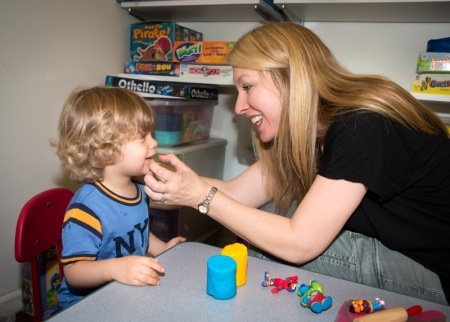The PROMPT© Difference
New York’s Premier PROMPT©-Certified Speech & Language Clinic
What is PROMPT©
PROMPT© is an acronym for Prompts for Restructuring Oral Muscular Phonetic Targets. The technique is a tactile-kinesthetic approach that uses touch cues to a client’s articulators (jaw, tongue, lips) to manually guide them through a targeted word, phrase or sentence.
How PROMPT© Works

The technique develops motor control and the development of proper oral muscular movements, while eliminating unnecessary muscle movements, such as jaw sliding and inadequate lip rounding. PROMPT’s© multidimensional approach to speech production disorders has come to embrace not only the well-known physical-sensory aspects of motor performance, but also its cognitive-linguistic and social-emotional aspects. PROMPT© is about integrating all domains and systems towards positive communication outcome. It may be used (with varying intensity and focus) with all speech production disorders from approximately 6 months of age onward. To achieve the best outcome with PROMPT© it should not be thought of or used mainly to facilitate speech-motor skills, produce individual sounds/phonemes or as an articulation program but rather as a program to develop motor skill in the development of language for interaction. PROMPT© therapy is appropriate for a wide range of clients with communication disorders. The most common clients have motor speech disorders, articulation problems or are non-verbal children. Many clients with aphasia, apraxia/dyspraxia, dysarthria, pervasive development disorders, cerebral palsy, acquired brain injuries and autism spectrum disorders have benefitted from PROMPT© therapy.

The technique develops motor control and the development of proper oral muscular movements, while eliminating unnecessary muscle movements, such as jaw sliding and inadequate lip rounding. PROMPT’s© multidimensional approach to speech production disorders has come to embrace not only the well-known physical-sensory aspects of motor performance, but also its cognitive-linguistic and social-emotional aspects. PROMPT© is about integrating all domains and systems towards positive communication outcome. It may be used (with varying intensity and focus) with all speech production disorders from approximately 6 months of age onward. To achieve the best outcome with PROMPT© it should not be thought of or used mainly to facilitate speech-motor skills, produce individual sounds/phonemes or as an articulation program but rather as a program to develop motor skill in the development of language for interaction. PROMPT© therapy is appropriate for a wide range of clients with communication disorders. The most common clients have motor speech disorders, articulation problems or are non-verbal children. Many clients with aphasia, apraxia/dyspraxia, dysarthria, pervasive development disorders, cerebral palsy, acquired brain injuries and autism spectrum disorders have benefitted from PROMPT© therapy.
Understanding the Levels of PROMPT© Training
The technique develops motor control and the development of proper oral muscular movements, while eliminating unnecessary muscle movements, such as jaw sliding and inadequate lip rounding. PROMPT’s© multidimensional approach to speech production disorders has come to embrace not only the well-known physical-sensory aspects of motor performance, but also its cognitive-linguistic and social-emotional aspects. PROMPT© is about integrating all domains and systems towards positive communication outcome. It may be used (with varying intensity and focus) with all speech production disorders from approximately 6 months of age onward. To achieve the best outcome with PROMPT© it should not be thought of or used mainly to facilitate speech-motor skills, produce individual sounds/phonemes or as an articulation program but rather as a program to develop motor skill in the development of language for interaction. PROMPT© therapy is appropriate for a wide range of clients with communication disorders. The most common clients have motor speech disorders, articulation problems or are non-verbal children. Many clients with aphasia, apraxia/dyspraxia, dysarthria, pervasive development disorders, cerebral palsy, acquired brain injuries and autism spectrum disorders have benefitted from PROMPT© therapy.
How PROMPT© Therapy Differs from Traditional Speech Therapy
PROMPT© is a process that involves fully evaluating a child’s strengths and areas of need including receptive/expressive language and social language skills. Therapy then is directly focused on all areas of communication. Therapy is socially driven and the vocabulary targets are functional and focus on language development. All speech targets are evaluated based on the Motor Speech Hierarchy (Hayden, 1986, 2013) which is a dynamic schema of how speech develops from a motor perspective. Therapy involves tactile-kinesthetic hands- on support to the muscles of the face, jaw and structures associated with vocalizing. This helps clients to “feel” the correct way to produce words in fun, functional interactive routines. Over time, PROMPT© therapy will build in complexity in terms of the motor load of speaking and the linguistic complexity.
